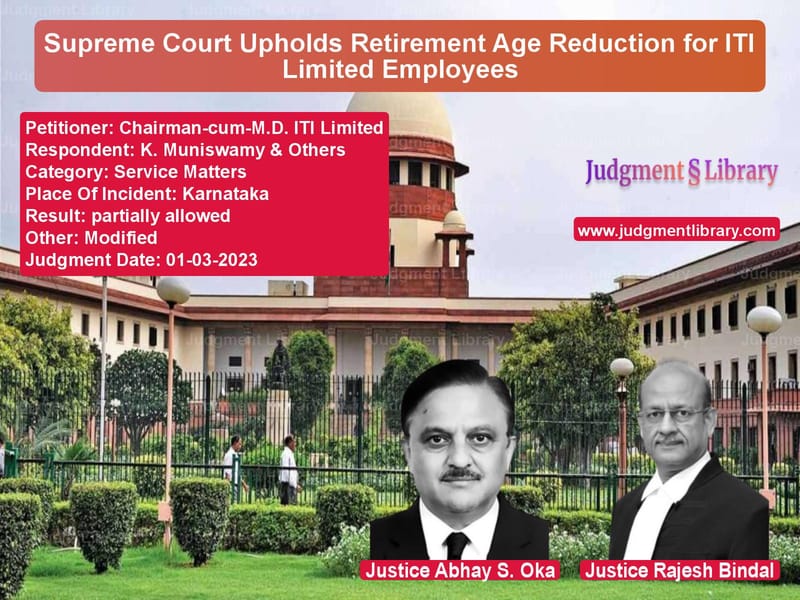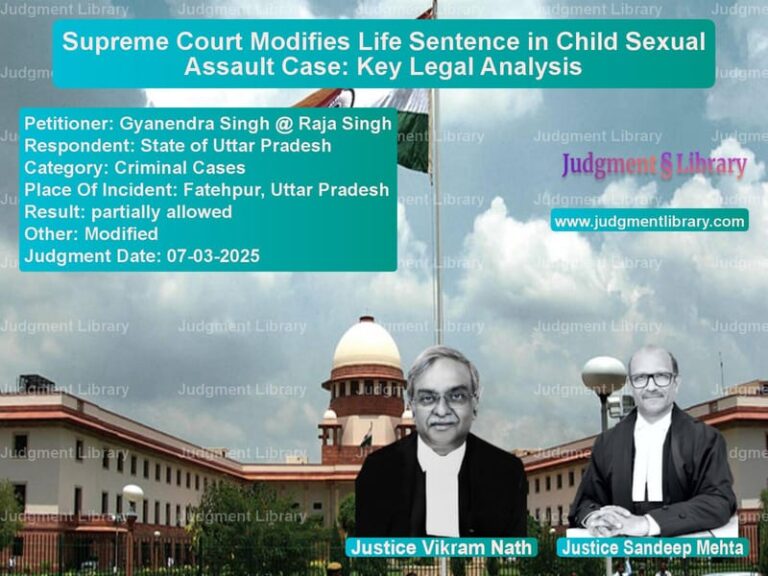Supreme Court Upholds Retirement Age Reduction for ITI Limited Employees
The Supreme Court of India has ruled in favor of ITI Limited, a public sector undertaking (PSU), by upholding the rollback of the retirement age from 60 years to 58 years. The case, Chairman-cum-M.D. ITI Limited vs. K. Muniswamy & Others, revolved around the interpretation of Clause 17(7)(iii) of the Certified Standing Orders under the Industrial Employment (Standing Orders) Act, 1946. The Court held that employees do not have an automatic right to extend their service beyond 58 years and that such an extension remains at the discretion of the employer.
Background of the Case
ITI Limited is a PSU under the Government of India. In 1998, the company amended Rule 35 of the ITI Conduct, Discipline, and Appeal Rules, 1975, increasing the retirement age from 58 to 60 years, subject to medical fitness. However, in November 2001, the Department of Public Enterprises allowed PSUs to roll back the retirement age, and ITI Limited decided to reduce it back to 58 years.
Read also: https://judgmentlibrary.com/supreme-court-upholds-police-authoritys-discretion-in-recruitment-case/
A group of employees challenged this rollback before the Karnataka High Court, arguing that it violated their rights under Clause 17(7)(iii) of the Certified Standing Orders. The High Court ruled that while the PSU had the authority to reduce the retirement age, it could not affect the existing rights of employees as per Clause 17(7)(iii). ITI Limited appealed this decision before the Supreme Court.
Arguments by the Appellant (ITI Limited)
- Clause 17(7)(iii) does not confer any right upon employees to remain in service until 60 years.
- The clause only allows the company to retain employees beyond 58 years at its discretion, based on medical fitness.
- The decision to roll back the retirement age was based on financial considerations and restructuring recommendations by PricewaterhouseCoopers.
- Reducing the retirement age was essential to achieving cost-cutting measures due to financial losses.
Arguments by the Respondents (Employees)
- Clause 17(7)(iii) created a legitimate expectation that employees would be allowed to serve until 60 years.
- Rolling back the retirement age affected employees who had planned their careers based on the earlier extension.
- The PSU’s decision was arbitrary and violated natural justice.
- Employees who had already attained 58 years should have been allowed to continue until 60.
Supreme Court’s Observations and Ruling
The Supreme Court examined Clause 17(7)(iii) of the Certified Standing Orders, which states:
“The employee who attains the age of 58 years may be continued in service up to the age of 60 years subject to medical fitness at the end of each year.”
The Court observed that:
- The use of the word “may” in the clause indicates discretion and does not create an absolute right for employees to demand service extension.
- The provision is an enabling clause that allows the employer to continue employees in service beyond 58 years only if required.
- The PSU was within its rights to reduce the retirement age after obtaining necessary approvals.
- Financial constraints and restructuring needs justified the rollback decision.
The Court held:
“Clause 17(7)(iii) does not confer any right upon employees to seek continuation after 58 years as a matter of right. It only grants the employer the discretion to retain employees beyond 58 years subject to medical fitness.”
Final Judgment
The Supreme Court modified the Karnataka High Court’s judgment and ruled:
- The rollback of the retirement age from 60 to 58 years is valid and cannot be challenged.
- Employees do not have an automatic right to remain in service until 60 years.
- Clause 17(7)(iii) only provides discretionary power to the PSU, which cannot be interpreted as a right for employees.
- The decision does not violate natural justice, as it was made following due process.
Implications of the Judgment
The ruling has significant implications for employment policies in PSUs and other government organizations:
- Employer Discretion in Retirement Age: Establishes that companies can determine retirement age policies based on financial and operational considerations.
- Clarifies Legal Position on Service Extension: Reinforces that discretionary service extension clauses do not create enforceable rights for employees.
- Precedent for Other PSUs: Provides clarity for other PSUs contemplating similar rollbacks in retirement age.
- Legal Safeguard for Employers: Ensures that companies can modify policies without being subject to excessive legal challenges.
Conclusion
The Supreme Court’s decision in Chairman-cum-M.D. ITI Limited vs. K. Muniswamy & Others underscores the principle that service extension provisions in employment contracts or standing orders do not automatically confer a right upon employees. By upholding the PSU’s discretion to roll back the retirement age, the Court has reinforced the authority of government enterprises to make policy decisions based on financial viability and restructuring needs. This ruling serves as an important precedent in employment law, especially concerning retirement policies in the public sector.
Petitioner Name: Chairman-cum-M.D. ITI Limited.Respondent Name: K. Muniswamy & Others.Judgment By: Justice Abhay S. Oka, Justice Rajesh Bindal.Place Of Incident: Karnataka.Judgment Date: 01-03-2023.
Don’t miss out on the full details! Download the complete judgment in PDF format below and gain valuable insights instantly!
Download Judgment: chairman-cum-m.d.-it-vs-k.-muniswamy-&-other-supreme-court-of-india-judgment-dated-01-03-2023.pdf
Directly Download Judgment: Directly download this Judgment
See all petitions in Employment Disputes
See all petitions in Public Sector Employees
See all petitions in Termination Cases
See all petitions in Judgment by Abhay S. Oka
See all petitions in Judgment by Rajesh Bindal
See all petitions in partially allowed
See all petitions in Modified
See all petitions in supreme court of India judgments March 2023
See all petitions in 2023 judgments
See all posts in Service Matters Category
See all allowed petitions in Service Matters Category
See all Dismissed petitions in Service Matters Category
See all partially allowed petitions in Service Matters Category







